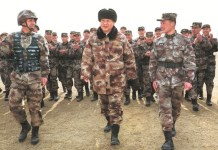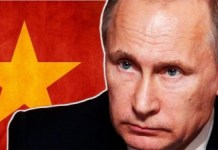After the India-China clash last month that killed 20 Indian soldiers in a border skirmish, several anti-China protests erupted around the country. Protestors burned effigies of Chinese President Xi Jinping and called for an “economic war” against China.
India Bets Big On Nikki Haley To Emerge As Vice Presidential Candidate Under Trump
Analysts have said that Indian Prime Minister Narendra Modi’s aggressive approach fits the mood of the public but it doesn’t go as far as wanting a full-blown war with its nuclear-armed, economically mighter neighbour.
As reported earlier by EurAsian Times, India and China saw the worst face off in the last 45 years on the border. After the troops of the two neighbouring countries clashed on the LAC in the Galwan valley leaving 20 Indian troops dead and an unknown number of Chinese casualties.
The efforts to defuse border tensions were somewhat resolved after a telephonic conversation between India’s National Security Advisor Ajit Doval and China’s Foreign Minister Wang Yi and through other diplomatic channels.
S-400 vs Rafale: Turkey to deploy Russian S-400 Missile to counter French Rafale Jets
PM Narendra Modi paid a surprise visit to troops near the Line of Actual Control (LAC) where he made a veiled comment on China saying “age of expansionism is over”. “History is witness that expansionist forces have either lost or were forced to turn back,” Modi said addressing soldiers in Ladakh’s Nimo.
“Modi would not let the nationalist fervour lead India into a war with China. He wants to use this nationalist sentiment, but he is also scared of the blowback it might cause,” said Liu Zongyi, secretary-general of the South Asia and China Centre at the Shanghai Institutes for International Studies.
Analysts have also argued that after the Bhartiya Janta Party (BJP) came to power, Modi has given a freer rein to the army since taking power in 2014. According to S. Kondapalli, a professor of Chinese studies at Jawaharlal Nehru University, the Congress party sought better relations with China after the brief border war in late 1962, which meant keeping the military on a tight leash.
“Congress was always very persuasive and would ask the military not to do this or that along the border because it would aggrieve China,” Kondapalli said.
Sumit Ganguly, a professor of political science at Indiana University explained that Modi and the BJP represent a Hindu-centric ideology, away from the secular and pluralistic nationalism that defined the country for more than half a century.
In August of last year, India revoked the special status of Jammu and Kashmir which had granted the northern Muslim-majority province a significant autonomy. Ganguly said the BJP’s Hindu-centric nationalism influences India’s approach to the issue with China because the contested border is in Kashmir.
He further said that Modi and the BJP justified the removal of Jammu and Kashmir’s special status by pointing to separatist Muslim insurgents in the region supported by neighbouring rival Pakistan.
Ganguly argued that because of the large Muslim minority in India, and Pakistan was created as a homeland for Muslims, it is easy to whip up a degree of nationalist fervour by painting Muslims as fifth columnists of Pakistan.
“Whereas with China, it’s much more difficult to whip up a similar kind of nationalism because the Chinese community in India is so minuscule, but that doesn’t mean Modi isn’t trying,” he said.
“China’s military power is nearly four times that of India. Even after the deaths of the Indian soldiers on June 15, Kondapalli said the BJP had never thought of taking the dispute into anything beyond the defence of a few kilometres of land along the border with China.




